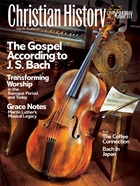Bach's "preaching" reflected what he read. The many sermon collections and commentaries in his personal library provided him with the necessary background for composing cantatas that interpreted and proclaimed the Word.
Only one item from Bach's library survives, as far as we know: the three-volume Deutsche Bibel (German Bible), edited by Abraham Calov and published in 1681-1682. Calov inserted Luther's comments on various Scripture passages or, if he could not find a comment by Luther, supplied his own.
The Calov Bible commentary is a vital source for understanding Bach's approach to Scripture. Each volume contains Bach's handwritten monogram. Bach underlined many passages, in both red and black ink and, most importantly, wrote his own comments in the margins. These markings give us a glimpse into Bach's personal beliefs and how he understood his vocation. Here are a few examples:
Exodus 15 records the song of praise sung antiphonally by those who had been released from slavery in Egypt, with Moses leading the men and Miriam leading the women. Alongside verse 20 ("Miriam the prophetess, the sister of Aaron, took a timbrel in her hand; and all the women went out after her with timbrels and with dances"), Bach wrote, "NB [nota bene, 'note well']. First prelude for two choirs to be performed to the glory of God."
1 Chronicles 25 lists the members of the musical families of Asaph, Heman, and Jeduthun who are given the responsibility to lead Israel's worship, and thus "prophesy with harps, with psalteries, and with cymbals." In the margin, Bach wrote: "NB. This chapter is the true foundation of all God-pleasing church music."
1 Chronicles 28:21 reads, "Here are the divisions of the priests and the Levites for all the service of the house of God … " Alongside Calov's commentary on the verse, Bach wrote, "NB. Splendid proof that, besides other arrangements of the service of worship, music too was instituted by the Spirit of God through David."
The heading in the Deutsche Bibel for the section 2 Chronicles 5:11-15 is "How the Glory of the Lord Appeared After Beautiful Music [in the Temple]." Bach underlined "Beautiful Music" and added in the margin by verse 13: "NB. Where there is devotional music, God with his grace is always present."
Copyright © 2007 by the author or Christianity Today/Christian History & Biography magazine.
Click here for reprint information on Christian History & Biography.

Support Our Work
Subscribe to CT for less than $4.25/month






























